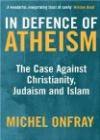Christopher Hitchens has grown on me. I will admit that I found his eloquence and wit arrogant at first, but grew to understand that his concerns and expressions are genuine, sincere, and often quite valid. This is not to say that Hitchens' critical appraisal of religion is, shall we say, gospel, but he is more often right about his observations than not. I have been disapproving of Hitchens in the past on this blog, but as I stated above, I've grown fond of him. god is not Great is a poignant reflection on the intersection of religio-political realities that, I think, every thorough-going Christian would benefit from reading, and re-reading.
Wilson is rigorous in his scholarship, and gives a first-rank account of the dwindling life of faith in Western nations. I found myself drawn in by Wilson's avuncular tone and subtle humour. This book is not easily accessible to the non-academic -- in fact, it might prove rather dull for such a person -- but it is invaluable to the serious student of religious history.
 Like: Michel Onfray presents an incindiary account of religious extremism, the rise of fundamentalism around the world, and the necessity of atheism as a reasonable antidote to religiosity. Humanity's health, happiness, and welfare depends on our willingness to reject religious extremism, and accept atheism.
Like: Michel Onfray presents an incindiary account of religious extremism, the rise of fundamentalism around the world, and the necessity of atheism as a reasonable antidote to religiosity. Humanity's health, happiness, and welfare depends on our willingness to reject religious extremism, and accept atheism.I was a little apprehensive at first with this slim essay given that it's original title was Atheist Manifesto, a title that sounded more political than philosophical. However, after a few pages, I was enthralled. Onfray's criticisms of religious fundamentalism are at once shocking and necessary; humorous and poignant; incisive and well-rounded. His pace is fast, unforgiving, and tough-minded. In particular, I enjoyed Onfray's post-modern style; a nice contrast to the soothing eloquence of typical brit-lit (british literature) I typically gobble up.
 Like: Traditional answers to the problem of suffering and the existence of an omni-benevolent God fail. Judeo-Christian attempts to wrestle with theodicy are a noble, but otherwise failed enterprise. Suffering works against the notion of a good God, and the Holy Bible does nothing to ameliorate the dilemma of continued suffering and the simultaneous existence of a personal, loving God.
Like: Traditional answers to the problem of suffering and the existence of an omni-benevolent God fail. Judeo-Christian attempts to wrestle with theodicy are a noble, but otherwise failed enterprise. Suffering works against the notion of a good God, and the Holy Bible does nothing to ameliorate the dilemma of continued suffering and the simultaneous existence of a personal, loving God.Bart Ehrman is not a difficult read. This is not to say that he is less penetrating in his observations; he is simply more personal, given to less arid prose in this volume. I'm sure this is due in large part to his personal encounters with his subject material: evil and suffering co-existing with a supposedly good God. At the same time, his scholarship is difficult to argue with, and his logic reasonable (though, I must admit, not air-tight). I think this volume would be perfect as an introductory level study into the seeming disparity between raw reality and Judeo-Christian claims about God's benificent nature.
 Like: A compendium of some of the most controversial, most insightful essays, poems, and declarations against the existence of gods/God, and the continuance of religion.
Like: A compendium of some of the most controversial, most insightful essays, poems, and declarations against the existence of gods/God, and the continuance of religion.Christopher Hitchens has accomplished an excellent work in this book of secular treatises. There isn't a page where a serious reader cannot turn and find some kind of hard-hitting logic, or poignant but witty rejoinder to the typical ideologies enshrouded in religious thought. More, writers from many different genres, scholarly fields, and artistic disciplines contribute highly intelligent accounts of their personal, and sometimes scientific reasons for disbelief. Certainly, if a person wishes to have an account of life, reality, and sundry other things, but from the perspective of the anti-religious, then this book is perfect.
No comments:
Post a Comment